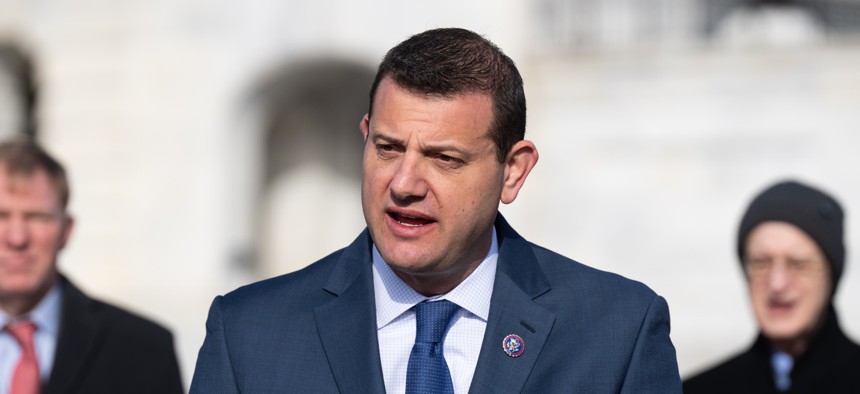
Rep. David Valadao, R-Calif., joined a bipartisan group of lawmakers to resurrect the Federal Retirement Fairness Act. Bill Clark/Getty Images
Bipartisan bill returns to help feds and postal workers close retirement gap
A bipartisan group is again pitching legislation that would allow some federal and postal employees who began their careers as temporary workers to contribute to their federal retirement accounts for those years.
A bipartisan group of House members is taking another crack at legislation designed to help some federal employees make catch-up contributions to their retirement accounts.
Reps. Gerry Connolly, D-Va., David Valadao, R-Calif., Nikki Budzinski, D-Ill., and Don Bacon, R-Neb., reintroduced the Federal Retirement Fairness Act on Monday, picking up the mantel for former Rep. Derek Kilmer, D-Wash., who put forth the legislation at least four times before leaving Congress in January.
The bill seeks to address creditable service gaps that some federal employees may have experienced early in their careers, when their temporary service did not allow them to deduct salary towards the Federal Employees Retirement System, including temporary U.S. Postal Service employees.
Those employees, who performed nondeduction service after January 1, 1989, either face extending their careers to obtain full federal retirement benefits or to leave without securing them.
The Federal Retirement Fairness Act would seek to correct that gap by allowing employees to retroactively contribute to their retirement for the time covering their nondeduction service years, replicating an option previously afforded to federal employees with temporary service prior to the FERS.
“For too long, federal employees who started their careers in temporary positions have been unfairly penalized when it comes to their retirement benefits,” said Valadao, in a statement. “The Federal Retirement Fairness Act is a common sense, bipartisan solution to ensure our hardworking public servants can retire on schedule.”
Connolly, whose district included nearly 52,000 federal employees in 2023, said in a statement that he was supporting the legislation during a “dark and uncertain hour for America’s civil servants.”
“No matter how they begin their careers, all federal employees deserve the opportunity to retire on time and with the full benefits they have earned,” he said. “The federal workforce is our nation’s greatest asset. They serve the American people with dignity and dedication every single day.”
Kilmer first introduced the legislation in 2018, and tried again in 2019, 2021 and 2023, with the bill never making it out of committee.
How are these changes affecting you? Share your experience with us:
Eric Katz: ekatz@govexec.com, Signal: erickatz.28
Sean Michael Newhouse: snewhouse@govexec.com, Signal: seanthenewsboy.45
Erich Wagner: ewagner@govexec.com; Signal: ewagner.47
NEXT STORY: What happens to my insurance when I leave the federal government?







